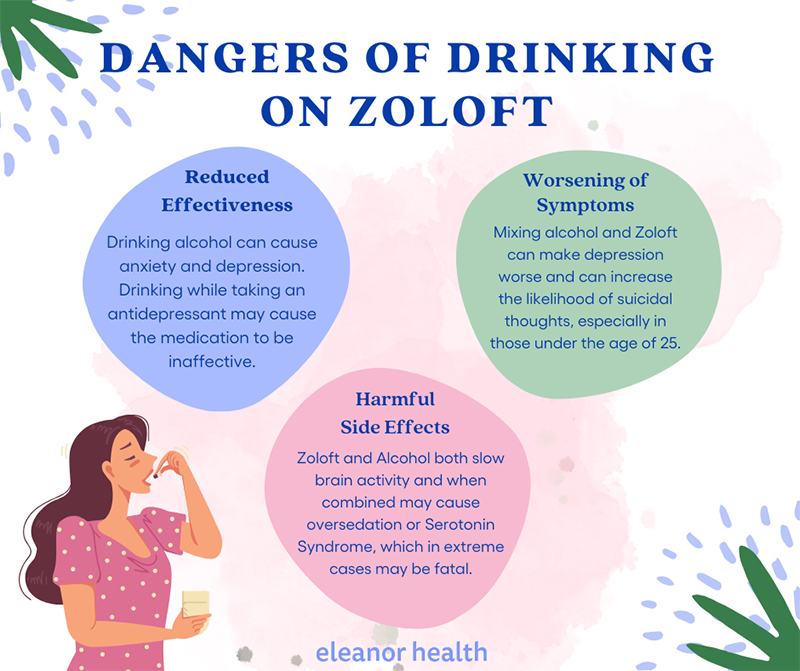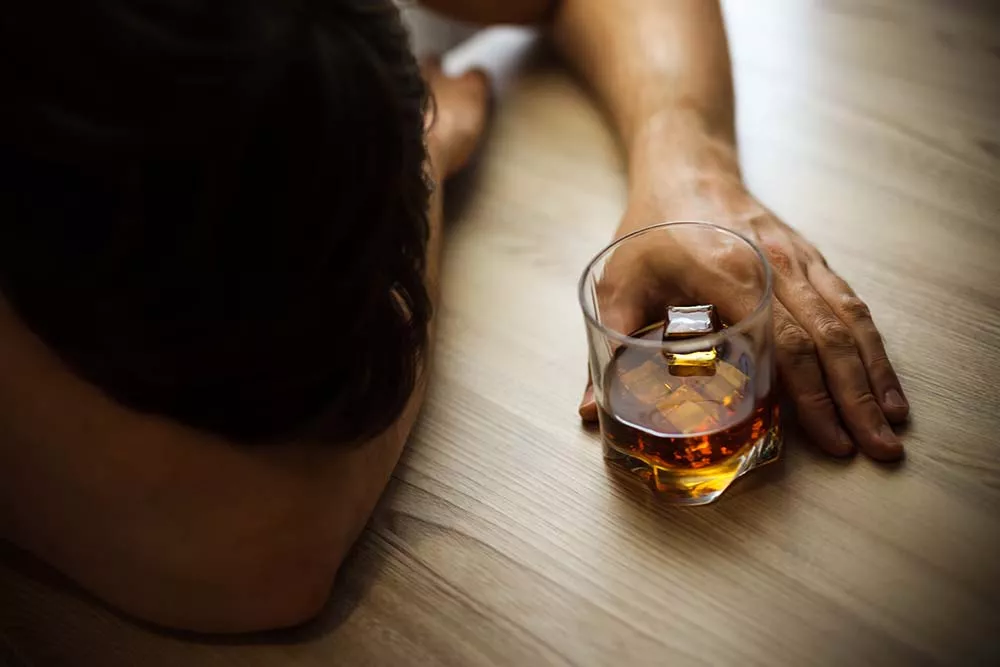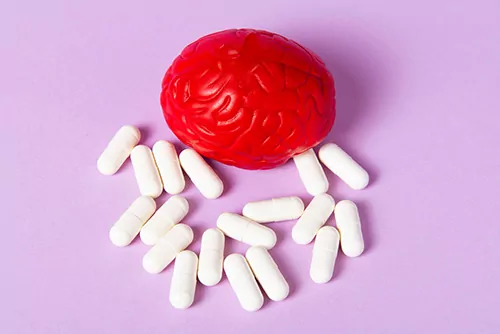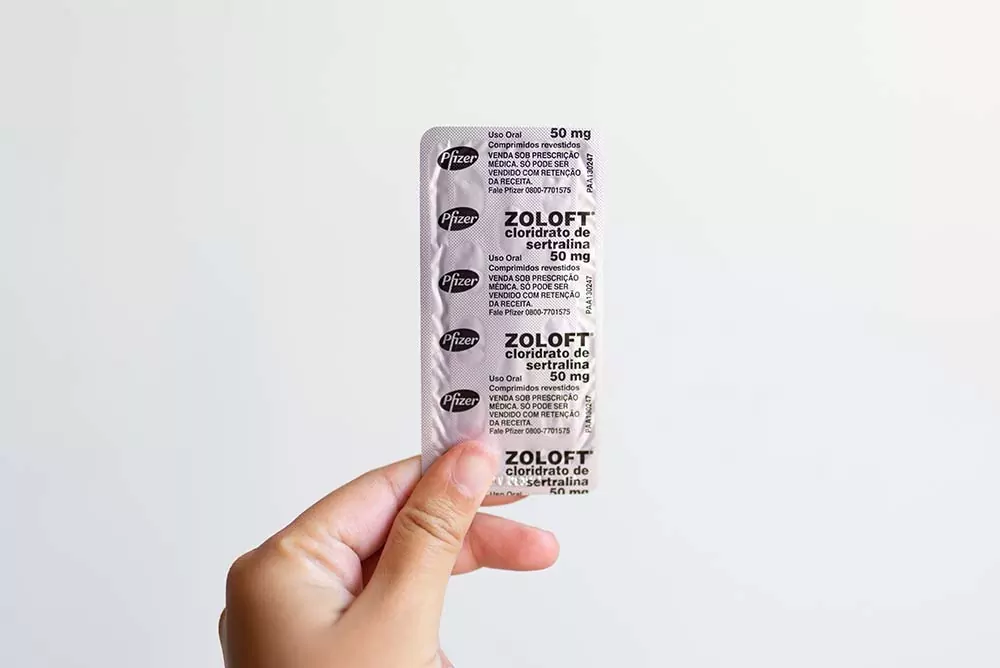Depression and anxiety are the most common mental health conditions in the United States, with an estimated 40 million adults suffering from an anxiety disorder, and an estimated 9.5% of adults suffering from a depressive illness each year. Fortunately, these conditions are treatable, with many patients effectively managing their condition through psychotherapy and/or medication.
While there are several types of antidepressants used to help treat anxiety and depression including serotonin and norepinephrine reuptake inhibitors (e.g. Cymbalta, Effexor and Pristiq), atypical antidepressants (e.g. Wellbutrin and Remeron), and serotonin modulators (e.g. Trintellix and Viibryd), the most commonly described first-line treatments are selective serotonin reuptake inhibitors (SSRIs), such as Zoloft (sertraline). Yet, if your doctor prescribes you or a loved one Zoloft for anxiety or depression, you may wonder how this could affect your lifestyle, particularly if you drink alcohol. Is it safe to drink alcohol while taking an SSRI? Keep reading as we take a look at how Zoloft works, the effect it has on the body, and the potential risks involved with combining alcohol and Zoloft.
Similar to other SSRIs, Zoloft works by blocking the brain’s serotonin receptors, preventing the brain from reabsorbing serotonin, and causing more serotonin to circulate in the brain. Serotonin is often referred to as the “happy” or “feel-good” hormone, as it helps stabilize a person’s mood and reduce overall anxiety. By increasing the amount of serotonin in certain areas of the brain, Zoloft can be very effective at helping people relax and feel content.
As with any medication, there is a risk that SSRIs such as Zoloft can cause side effects. While SSRIs have been proven to be some of the most safe and effective antidepressants available, every person’s body reacts differently to these medications. While many side effects resolve over time, people taking Zoloft can experience some reactions including the following:

While many people enjoy drinking alcohol for multiple reasons, most medical professionals recommend against drinking while taking an SSRI such as Zoloft. We will review some of the reasons why below.
Alcohol can affect mood and anxiety in a number of ways. While consuming it, you may feel more relaxed and content, however if you drink too much or too often, alcohol has the opposite effect. When alcohol leaves your system you can experience withdrawal symptoms. Severe withdrawal symptoms from alcohol can be fatal but even mild to moderate drinking can lead to mood swings, inability to stay asleep and panic symptoms.
Due to alcohol having these effects on mood and anxiety, drinking while taking an antidepressant may prevent it from working well at reducing those symptoms.
On rare occasions SSRIs can increase the risk for suicidal thinking, particularly in children and young adults when they first start the medication. This risk becomes even greater when combining alcohol with an SSRI. As stated above, drinking can lead to worsening of mood symptoms and reduced effectiveness of antidepressants. Alcohol also impairs judgment and increases impulsivity. Combined, these factors can increase the likelihood that someone will consider suicide if they drink alcohol while taking an SSRI, particularly if they are under 25.
Zoloft is a central nervous system depressant, which means it can help slow down brain activity. This can lead to relaxation but it can also lead to drowsiness and slowed breathing. Alcohol is also a central nervous system depressant, and when taken together, these effects are amplified and can be dangerous. Slowing down the brain and body can lead to issues with concentration and coordination, which can lead to accidents and injuries. Oversedation from drinking and taking Zoloft can lead to vulnerable situations, such as being taken advantage of by strangers. In excessive amounts, it can even lead to coma and death.
Additionally, alcohol can temporarily boost the amount of serotonin in the brain. As we previously mentioned, SSRIs increase the amount of serotonin in the brain as well and combining alcohol and Zoloft can lead to dangerously high serotonin levels. This results in a condition called serotonin syndrome. This is a life-threatening condition with symptoms that include extreme changes in blood pressure and heart rate, hallucinations, muscle rigidity and extremely high body temperature. It can lead to seizures, trouble breathing, kidney failure and death.
So, can you drink any alcohol while taking Zoloft? Officially, the FDA recommends that people who take Zoloft avoid drinking alcohol altogether. However, everyone’s bodies react differently to this combination, and some people find that they can drink in moderation while taking Zoloft without experiencing any negative effects.
If you think that you want to try drinking while taking Zoloft, it is critical that you talk to your mental health provider before doing so and review the risks. They can help you decide if doing so is safe given your dosage and medical history.
If you decide to try drinking alcohol while taking Zoloft, it is critical that you look out for signs of potentially dangerous interactions such as extreme changes in heart rate, confusion, shallow breathing, or thoughts of suicide. If any of these symptoms occur, seek immediate emergency medical help.
If you are struggling to reduce or stop drinking, reach out to an addiction specialist for more support.
 Alcohol and Depression: A Cycle
Alcohol and Depression: A Cycle
 What are SSRIs?
What are SSRIs?
 What does Zoloft do? (Sertraline)
What does Zoloft do? (Sertraline)